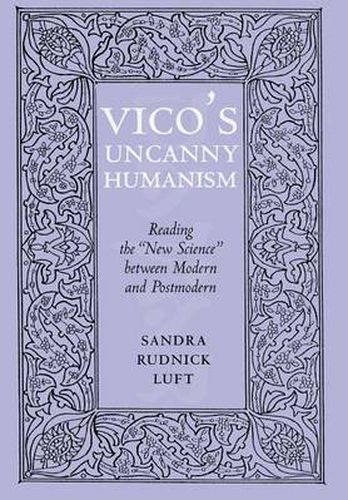Readings Newsletter
Become a Readings Member to make your shopping experience even easier.
Sign in or sign up for free!
You’re not far away from qualifying for FREE standard shipping within Australia
You’ve qualified for FREE standard shipping within Australia
The cart is loading…






Sandra Luft, in her ambitious postmodernist reading of Vico’s influential The New Science , asserts the strangeness of texts that struggle to understand human existence outside the assumptions of traditional humanism. One of her central arguments is that Vico as a thinker moved toward such an alien understanding. Despite his warning against the tyranny of familiar conceits , his work is commonly read within the traditional philosophic assumptions of the West - assumptions that she shows cannot contain nor explain the work’s novelty. The book includes extensive comparisons of Vico with Nietzsche, Heidegger and Derrida. Luft does not regard Vico as a precursor of the postmodern, which she sees as a recurring perspective in the West, one critical of the assumptions underlying traditional humanist conceptions of human nature and knowledge. Luft finds anachronistic not the question of Vico’s affinity to postmodern ideas, but rather his identification with traditional humanism and modernism by modern scholars. Luft’s reading brings to the fore radical existential issues in The New Science : its concern with origins, with the power of language and social practices, and with its critique of human subjectivity. That perspective makes Vico interesting and important for a wide circle of contemporary readers.
$9.00 standard shipping within Australia
FREE standard shipping within Australia for orders over $100.00
Express & International shipping calculated at checkout
Sandra Luft, in her ambitious postmodernist reading of Vico’s influential The New Science , asserts the strangeness of texts that struggle to understand human existence outside the assumptions of traditional humanism. One of her central arguments is that Vico as a thinker moved toward such an alien understanding. Despite his warning against the tyranny of familiar conceits , his work is commonly read within the traditional philosophic assumptions of the West - assumptions that she shows cannot contain nor explain the work’s novelty. The book includes extensive comparisons of Vico with Nietzsche, Heidegger and Derrida. Luft does not regard Vico as a precursor of the postmodern, which she sees as a recurring perspective in the West, one critical of the assumptions underlying traditional humanist conceptions of human nature and knowledge. Luft finds anachronistic not the question of Vico’s affinity to postmodern ideas, but rather his identification with traditional humanism and modernism by modern scholars. Luft’s reading brings to the fore radical existential issues in The New Science : its concern with origins, with the power of language and social practices, and with its critique of human subjectivity. That perspective makes Vico interesting and important for a wide circle of contemporary readers.